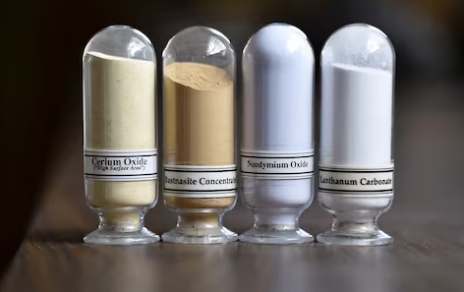
Samples of rare earth minerals from left, Cerium oxide, Bastnasite, Neodymium oxide and Lanthanum carbonate are on display during a tour of Molycorp's Mountain Pass Rare Earth facility in Mountain Pass, California June 29, 2015.
Creating a domestic supply chain for rare earth magnets, essential for automotive, clean energy, and defense sectors, could take years. This follows global supply chain disruptions after export limits were imposed by a key supplier on April 4, affecting industries worldwide, particularly automakers. That supplier processes 90% of global rare earth magnets.
The Ministry of Heavy Industries is developing a plan to provide production-based financial support. A source noted: “The scheme includes partially covering the cost difference between locally produced magnets and imported ones.” This aims to ensure cost competitiveness and boost local demand. Funding details are pending, with government-industry meetings scheduled for next week.
India’s IREL mines rare earths mainly for defense and atomic energy, while commercial needs rely on imports. With 6.9 million tons of rare earth reserves, India ranks third globally, per the U.S. Geological Survey, but private investment in mining remains low. The National Critical Mineral Mission, launched in April, targets self-reliance, including exploration for neodymium, vital for automotive magnets.
The auto industry faces urgent supply risks. The Society of Indian Automobile Manufacturers warned that production could stop by late May or early June. Globally, firms like Suzuki Motor have halted production of models like the Swift. An executive said: “The short-term solution has to be to get Chinese authorities to clear things,” as supply chain shifts are not immediate. Operations may continue until late June, but extended shortages could disrupt all vehicle production.
The Ministry of Heavy Industries plans to send auto executives to Beijing to expedite supply approvals. India exports neodymium to Japan due to limited processing capacity, with $7 million in exports to Toyota Tsusho from January to April. Modi’s office recently assessed the magnet shortage’s impact on the electric vehicle sector and considered tariff exemptions for machinery imports. A source affirmed: “The government is looking into it critically. They are serious.”